
The first thing that comes to mind when talking about face lifts is plastic surgery. However, not everyone wants and can expose themselves to radical influences. A compromise option in this case are numerous minimally and non-invasive rejuvenation techniques.
Non-surgical facelift– this is a whole layer of various procedures that can improve the condition of the skin, eliminate sagging tissues and add clarity to the oval without surgery and associated difficulties.
The main advantages of such techniques compared to surgery are relatively low cost, low trauma and fewer contraindications. At the same time, with their help it is not always possible to achieve such an impressive result as after surgery, and it does not last so long, usually up to 2-3 years, which partly compensates for the advantage in terms of costs.
Basic methods of non-surgical facelift
All non-surgical facelift procedures can be divided into several large groups:
- Injectable– subcutaneous administration of drugs that help improve the tone and general rejuvenation of the skin. This includes, in particular, some types of mesotherapy, contouring and plasma lifting
- Hardware– are performed on equipment that uses various types of energy (lasers, radio waves, microcurrent, etc. ) to act on the skin.
- Lifting with wires– installation of special biocompatible threads under the skin, with the help of which tissues are moved to a new position. Most types of thread lifts are surgical techniques, but their invasiveness and number of contraindications are significantly lower than other anti-aging facial surgeries
- Deep peels, during which the upper layers of the dermis are removed. Stimulate skin renewal and thus provide a lifting effect
- Manual practices– various massage techniques aimed at improving the tone of the facial muscle structures and activating the metabolism.
Lifting with injections and facial rejuvenation
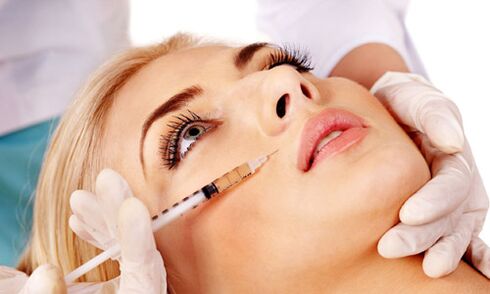
One of the safest and most common methods of this group ismesolifting– a variant of mesotherapy using a specially selected complex of moisturizing and strengthening active substances, which activates the cell renewal process, fills them with moisture and improves local blood circulation. The standard course consists of 3-5 procedures, the duration of the result is from 6 to 18 months. After mesolifting, aged and sagging skin is visibly smoothed, appears fresh and young, deep static wrinkles are attenuated and small expression lines disappear, the skin is renewed at a cellular level, its complexion is uniformed, firmness and elasticity.
PlasmoliftingORPRP therapyit is an injection of the patient's blood (or rather, plasma that has undergone special pretreatment). The course lasts 4-5 sessions, the result lasts about 1 year. Plasmolifting acts both locally, at the cellular level of the skin, triggering the synthesis of collagen fibres, and has a rejuvenating effect on the entire body as a whole: it stimulates the immune system, triggers the processes of cell regeneration and renewal. Furthermore, plasma, like a biological glue, attaches the facial skin to the underlying structures, eliminating age-related tissue ptosis. After completing the course, the skin smoothes, becomes more elastic, toned, fine wrinkles disappear and deep wrinkles diminish.
If meso and plasmolifting have a complex effect on the entire face, firming and rejuvenating it, thencontour plastic surgery with fillersANDbotulinum therapydesigned to specifically address specific age-related issues.
- Filler injections are intended to fill deep wrinkles, replenish the volume of missing tissues and correct the shape of the face. Today, cosmetologists have a wide range of products at their disposal, mainly based on high-density hyaluronic acid, designed to correct some age-related facial defects.
- Botulinum therapy uses drugs based on botulinum toxin type A, which block the nerve endings in the injection area and prevent them from contracting the facial muscles. As a result, the skin is smoothed and even deep expression lines are reduced or disappear completely.
The effect of remodeling and botulinum therapy lasts approximately 8-12 months, depending on the activity of metabolic processes and other individual characteristics of the body.
Hardware tightening methods
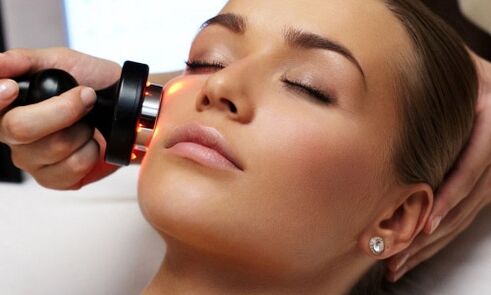
How most methods workhardware liftingthe same: the subcutaneous tissue is heated by a targeted action, which stimulates the compaction of existing collagen fibers and the production of new collagen and elastin. As a result, wrinkles are smoothed, pores tighten, the skin firms and becomes elastic. The main differences between these procedures are the type of energy used (laser, radio waves, etc. ). Otherwise they are very similar: they are performed in cycles of 3-5 sessions and the duration of the result is approximately 2 years. Today the most widespread methods are:
- Laser thermolifting– laser energy is used;
- ELOS facelift– based on the influence of two types of energy simultaneously: laser and light;
- Radio frequency (RF) lifting.– low power, high frequency radio waves are used.
Another option -microcurrent therapy, – works a little differently. In this case, skin cells are stimulated by microcurrents and specially developed biological preparations containing strong antioxidants that activate the skin's natural regeneration mechanisms.
The standard course of such non-surgical facelift consists of 4-5 procedures performed once a week. The main advantages of this method include a minimum number of contraindications and complete harmlessness for the body. Microcurrents activate the metabolism, normalize the chemical composition of cells and increase tissue elasticity: for this reason they are often used as a restorative procedure after surgery.
Lifting with wires
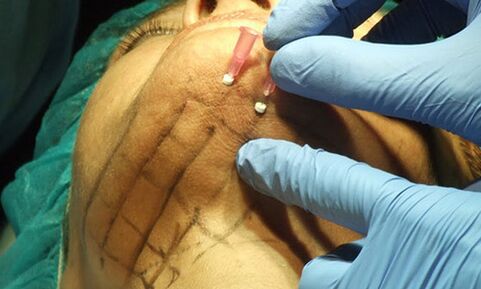
This is a minimally invasive technique in which thin threads are inserted under the skin. Then they are raised, moving behind them and fixing the soft tissues in the desired position. The procedure is quick and safe, but still quite serious, so it should be performed not by a cosmetologist who works with the "outer part" of the face, but by a plastic surgeon who knows its internal structure well. Depending on the general indications and personal preferences of the patient, the following can be used:
- Non-absorbable threads, made with biocompatible materials such as polypropylene.
- Mesothread- are considered a little less effective, but consist of polylactic acid, which does not remain under the skin, but is completely absorbed after a few months. In addition to actual firming, they have a beneficial effect on the general state and health of the skin (similar to mesotherapy, hence the prefix "meso" in the name)
The obtained result lasts on average 2-3 years, after which it is possible to install additional threads or choose a different technique (the already installed threads will not interfere with either cosmetic procedures or surgical facelift). Some of the non-absorbable threads may be "tightened" in the future, but there is no consensus among experts on whether such manipulation is appropriate.
Deep peels
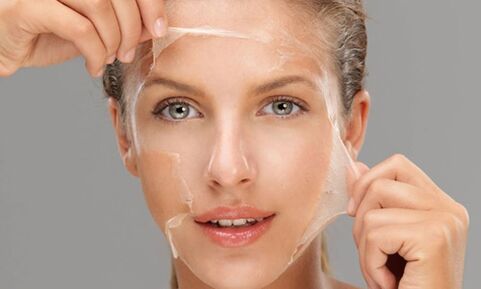
These are rather traumatic and painful, but at the same time very effective procedures, with the help of which it is possible to enhance the regeneration processes of the skin, improve its color, smoothness and elasticity, as well as eliminate many external defects (hyperkeratosis , hyperpigmentation, etc. ).
- Duringdeep chemical peelAcidic compositions based on phenol are applied to the face, which destroy the upper layers of the skin up to the center of the reticular layer of the dermis. The procedure is performed only in a clinical setting, under general anesthesia, as a full-fledged operation.
- Deep laser resurfacingcombines two processes: the application of thermal microtraumas to the skin, which trigger internal recovery mechanisms in it, and the vaporization (evaporation) of old cells. Modern fractional ablative lasers perform both of these actions simultaneously, which allows you to achieve a more pronounced lifting effect in fewer sessions than previous generations of lasers.
The recovery period after deep peels is quite long (rehabilitation takes up to 2 weeks). The effect lasts approximately 1 year. If we compare both procedures, laser resurfacing has one important advantage: the ability to adjust the power and depth of the impact "on the fly". This allows you to select optimal parameters for each area, even very sensitive ones (eyelids, lips, neck), which is impossible to achieve with chemical peeling. Furthermore, the cooling system makes it less painful, allowing the use of local anesthesia.
Massage as a non-surgical facelift method
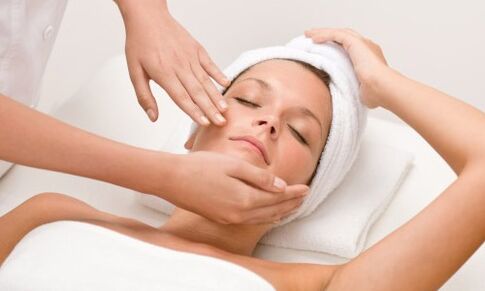
With the help of manual manipulation it is also possible to achieve a certain lifting effect, although among experts there are very different opinions regarding its severity and duration. The most popular procedure of this group issculptural facial massage(plasticizing massage, facial massage according to Joelle Siocco and other proprietary techniques).
The principle of its action is based on deep strength training of facial and non-facial muscles with simultaneous activation of lymphatic drainage. The masseur "sculpts" the contours of the face, correcting problem areas. As a result, the oval becomes lighter, the manifestations of age-related changes are reduced, muscle tension is relieved, and skin color improves.
The standard course is 10-12 sessions, which are carried out every 2-3 days. Additional maintenance procedures are required 2-3 times a month, which is a relative disadvantage of this non-surgical facelift method. The obvious advantages of sculptural massage are the absence of pain, complete safety, no rehabilitation period, no risk of complications, no skin irritation. The obvious disadvantage is that the results are significantly less pronounced than other procedures described above.
How to choose the best non-surgical facelift technique?
To smooth out and possibly completely eliminate the signs of aging, it is necessary to determine the causes of their appearance. This unique diagnosis is one of the main tasks of a cosmetologist or plastic surgeon. It is he who should be entrusted with the choice of a specific method of rejuvenation or their combination. In the case of a face, the question is usually:How "deeply" are age-related changes localized?
- If they mainly affect the skin – e. g. We are talking about small wrinkles, noticeable changes, decreased firmness: preference is given to methods that affect the dermal layer (restoration, compaction, strengthening of the elastin-collagen structure, smoothing of existing defects). For this purpose, peeling, thermolifting, plasma therapy and mesolifting are used.
- For problems with the subcutaneous structures of the face (deep wrinkles, pronounced nasolacrimal grooves, jowls, bags under the eyes, loss of clarity of the oval of the face, double chin), choose methods that affect the muscular structure and hypodermis. These include thread lift, botulinum therapy, contouring, microcurrent and sculptural massage.
- In many cases, changes affect both the skin and internal structures, so to achieve a pronounced effect, a thoughtful combination of several rejuvenation techniques is required.
The opinion of the experts
Journalists asked leading cosmetologists to comment on the effectiveness of using some non-surgical facelift options and also turned to plastic surgeons for professional advice:
"The question is much simpler than it may seem. In order not to make a mistake in the choice of technique, in order not to undergo the operation earlier than expected, but also in order not to spend more time than expected in aesthetic studies, it is necessary to consider only three things:
- Soft tissue condition, degree of ptosis.If age-related changes have not gone too far, we can talk about non-surgical solutions. If we are talking about pronounced folds and sufficiently large excess skin, do not waste time and money on cosmetology, do not fool yourself. Excess skin will not disappear on its own, it can only be removed with a scalpel, and only a plastic surgeon will help you here.
- Age.Up to the age of 40 (most of the time), cosmetic procedures work quite well. After 40, their effect becomes less and less noticeable, and after 50, if you need a real effect, and not just treatment, you should seriously think about surgical intervention.
- The patient's wishes.Only you determine who to go to and what you need. Not all women want to look 10-20 years younger; for many it is simply important to look well-groomed and fresh enough for their age. This problem can be solved without surgery. Dull skin color, sagging skin, fine wrinkles, age spots, etc. – cosmetologists deal with all these problems well. But if you are not satisfied with the drooping contours of the face, drooping eyelids, cheeks, bags under the eyes, double chin or folds on the neck, just turn to a surgeon.
If you need a very small lift, pay attention to vector lifting with various threads or contour plastic surgery. By repeating these procedures 1-2 times a year, it is possible to postpone the operation for several years. You yourself will be able to understand when the resulting effect no longer suits you and the time comes to think about more radical methods. "
"Non-surgical methods, of course, will not replace plastic surgery, but they are a good means of prevention and can delay the visit to the surgeon for a long time. It may be advisable for women to resort to gentle facelifts (hardware cosmetology) starting from 25 years. Almost all of the methods listed in the article can help with some subtle age-related changes. Our specialists use some of these procedures individually, but most often as part of a comprehensive program.
Therefore, after a surgical facelift, stagnation may occur, which can be easily treated with the help of microcurrents. Contour plastic surgery with fillers allows you to correct minor age-related changes, but in this case plasma fillers (analogues of hyaluronic acid fillers, produced from the patient's blood) have proven themselves better.
Botulinum toxin A preparations, of course, give good results and it is impossible to replace them with analogues. Radiofrequency facelift also gives a good effect both for the prevention of aging and during maintenance therapy after plastic surgery. But in our clinic phenol peeling is not used due to its traumatic character.
A significant advantage of non-surgical facelift procedures is that they can be recommended to patients at quite a young age, with subtle age-related changes. For example, a gentle alternative to blepharoplasty can be plasma, laser or RF facelift, as well as mesophiles: what exactly to choose will depend on the "severity" of the skin, the depth of wrinkles, the age of the patient and the presence of certain contraindications".
"I would like to point out right away that, of course, none of the minimally invasive techniques can compete in terms of effectiveness with surgical interventions. However, it often happens that the patient's health does not allow him to take such a step, or that the specific situation does not still requires surgery. In these cases, minimally invasive cosmetology comes to our aid.
Thread lift, laser lift and RF lift techniques can delay the need for surgery and serve as a kind of temporary substitute for surgical facelift techniques. Botulinum therapy and fillers can eliminate wrinkles. Plasmolifting improves the firmness of the skin and its general condition. Peels are also responsible for the firmness, color and quality of the skin. These procedures are effective in their scope, but do not represent a direct alternative to plastic surgery.
Almost all procedures described in the article are performed in the clinic, however, each of them has both indications and contraindications. In particular, for patients who come to us for a total facelift, I recommend the plasma facelift before and after the operation, this allows us to shorten the rehabilitation period. But it is not worth doing any hardware rejuvenation procedures before surgery. "
"Currently there are a number of effective methods of non-surgical facial rejuvenation, but it is important to understand the difference in the skills of a plastic surgeon and a cosmetologist. The surgeon creates the contour of the face, the cosmetologist improves the quality of the skin. And the aging is manifested by sagging skin and muscles, a decrease in skin tone and a deterioration of its quality. In total, there are about 5 types of aging, depending on their manifestations, and a rejuvenation program is developed, including l use of non-surgical techniques.
Today I consider hardware procedures (laser fractional photothermolysis, laser thermolifting), RF lifting, as well as contour plastic surgery and thread lifting to be the most effective. But it should be honestly noted that with severe ptosis and a large amount of subcutaneous fat, all types of hardware lifting are ineffective, since they affect the deep layers of the skin without affecting its surface. Also very popular and effective is the so-called 3D facial modeling, which uses a number of measures: modeling, thread lifting, botulinum therapy.
In general, we have a fairly large selection of minimally invasive facelift methods in our arsenal, but to achieve the best results, an integrated approach is always needed. A single method, however valid, cannot solve all problems. "

























